Orszag Promises Deficit Reduction Next Year
In a speech given today at New York University, OMB Director Peter Orszag said the Administration intends to cut the deficit in half by the end of President Obama’s first term. Here is what he had to say (emphasis added):
…the deficit for last fiscal year was $1.4 trillion, or 10 percent of our economy. Next year’s deficit is expected to be about the same size, and current projections show $9 trillion in deficits over the next 10 years, averaging about 5 percent of GDP. Deficits of this size are serious – and ultimately unsustainable...To bring deficits down to a sustainable range, therefore, will require more action once the economy is into a recovery. We are currently considering a number of proposals to put our country back on firm fiscal footing, and to cut the deficit we inherited in half by the end of the President’s first term.
In light of current health care reform negotiations, Orszag indicated that the Administration’s focus will continue to focus on deficit reduction once the president signs a health care bill. Even though rising health care costs are the single largest threat to the country’s future fiscal health, health care reform alone cannot bring budget deficits back to sustainable levels (See Principle #4 in CRFB’s Five Principles for Responsible Health Care Reform). As he explained:
Once health reform is passed, however: the job of getting our nation back on a fiscally sustainable course will not be complete. Our current projections of 4 to 5 percent of GDP in budget deficits in the out-years are well above the fiscally sustainable level of roughly 3 percent.
Based on information from a spokesman for Orszag, an article from the Seattle Times reported that halving the deficit by 2013 would mean a deficit of around $650 billion. In its Mid-Session Review, the OMB estimated a $775 billion deficit in 2013, which would require the Administration to identify $125 billion in spending cuts or tax increases to live up to its pledge -- even more if the economy looks more like the forecast from CBO than OMB. Orszag said that the president and his economic team are currently working on a range of deficit reduction options for the FY 2011 budget in February, but did not offer any details.
CRFB applauds these kinds of pledges from the Administration. At the same time, we encourage a much more ambitious deficit reduction plan beyond 2013. $650 billion would still be around 4 percent of GDP -- well above the 3 percent Director Orszag suggests is sustainable. And growing Social Security and Medicare costs threaten to make things much worse over the long-run.
Of course this can't all occur at once, for a combination of political, microeconomic, and macroeconomic reasons. As Orszag explained, “it took us years to dig ourselves into the current fiscal hole. And, it will take years for us to get out.”
But if we don't start digging ourselves out of it soon -- or at least coming up with a plan to do so -- we may be stuck in it for a long time.


